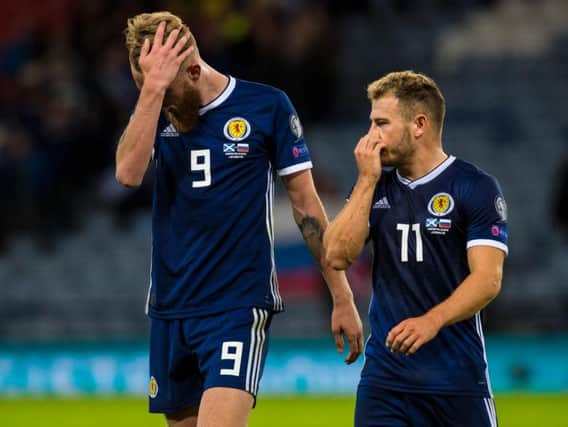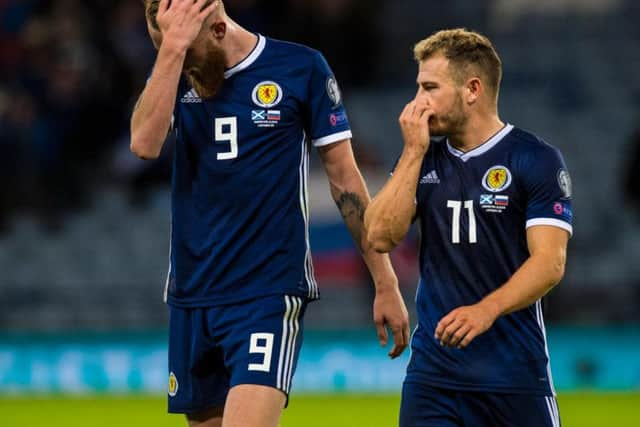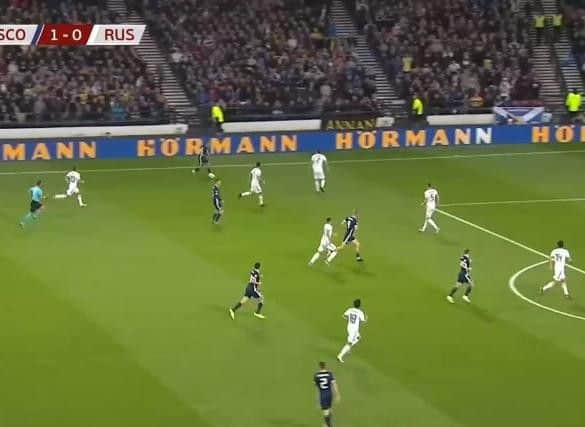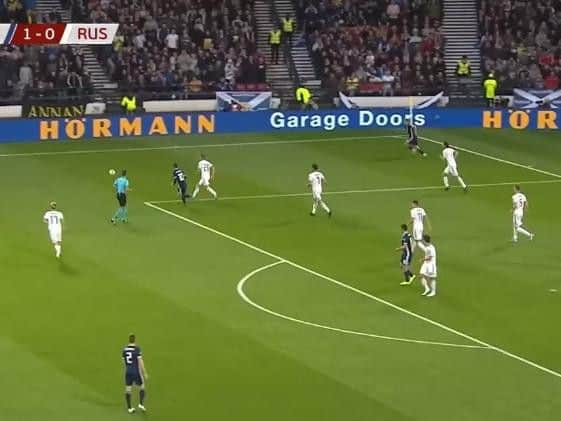Comment: Scotland aren't in need of a hero, they are in need of a miracle - and it starts by finding an identity which has been lost


Jorge Sampaoli, through his Chile team which won the country its first ever Copa America and the Universidad de Chile side which came before, knew exactly how to exhilarate the watching public.
The follically-challenged Argentine could have been standing outside of Hampden Park for years, more than a decade, maybe 21 years and his obsession of seeing “people leaving the stadium with a smile on their faces” would have been put to the test and likely wilted among the gloom and despondency.


The latest case being Friday night.
Advertisement
Hide AdAdvertisement
Hide AdThose watching Scotland effectively step aside in a 2-1 defeat to Russia from the ScotRail offices would have been popping the champagne corks, firing off confetti cannons. The direction of the public's ire and disappointment had switched from the transport equivalent of Delboy and Rodney - without the highs - to Steve Clarke and his merry men of misfortune.
To say Scotland surrendered to the Russians would be complementary. It would hint at a degree of competency, that they knew what they were doing.
They were, for 75 minutes, passive, paralysed by fear.


It was epitomised by captain Andy Robertson, who admitted the team were a “bag of nerves”.
In the 42nd minute he brought the ball down on his chest before getting caught in two minds, taking a loose touch and over running the ball. It prompted a half-hearted attempt at winning the challenge. Seconds later the ball rolls to his feet in the box and he hacks the ball away as if overtaken by the jitters, straight to an opponent.
A Champions League winner and on the shortlist for the best left-back in the world.
Instances such as these. The inability to hold on to the ball, to make it stick in the final third, the regression to the box, the lack of aggression, the lifelessness was stark in comparison to the opening 15 minutes.


A 15 minutes which Belgium boss Roberto Martinez said were “the best I have seen Scotland for many years.”
Whether the former Motherwell midfielder was having his fun with the assembled media ahead of Monday night’s clash or it was a genuine assertion, it was damning. Clarke’s men were good, they were positive and competitive but it was hardly anything to tell the grandchildren about. Yet, such is the state of stasis the country’s football team are in it actually could be the case.
Advertisement
Hide AdAdvertisement
Hide Ad“Well, Gary. You should have seen us in ‘19! A Friday night in September. I was there!”
“Really Grandad?! You are so lucky.”
“Aye, one of the 32,432 brave souls. I even took a ScotRail train. It was only delayed 15 minutes.”
“What times they must have been, Grandad.”
“What times indeed! And we took an early lead through a scrappy John McGinn goal. It was 1-0 going on… 1-0. For 15 minutes we were orite! Those were the days!”
The opening period was good for the Scots. It offered a template as to how to play.
Three seconds in and Liam Cooper clipped a ball deep into the Russia half. Oli McBurnie jumped and missed it but it was enough to put off Fedor Kudryashov. John McGinn picked up on the loose ball before feeding McBurnie who moved it on to Ryan Fraser. His shot rebounded and McGinn picked up the ball again.
It set the tone.
Another long ball to McBurnie saw a Russian midfielder forced to put it out for a corner from outside the box. By the seventh minute, Aleksandr Golovin, a star for the Russian side, passed it out the pitch under pressure.
Scotland were making Russia nervous, forcing them into errors, wayward passes. In possession the Scots were positive, especially Ryan Fraser.
In ‘Image 1’ we can see the attacking intent in the team with six players in or around the final third, against seven Russian defenders. The ball was cleared from the box a few seconds later and due to the number of Scotland players in the vicinity it was quickly picked up on with their opponents pinned back as we see in 'Image 2'.
Moments later it stopped.
Advertisement
Hide AdAdvertisement
Hide AdFor 15 minutes Scotland fans got a look at what the country’s footballing identity should be. Direct, positive, fast, aggressive and anarchic.
Scotland have been and still are lost in terms of what they want to be. The Barcelonafication of football for a period under Pep Guardiola saw clubs try to plagirise and force evolution, not taking into account history, identity and culture.
As such, so many prototypes arrived around the world. Knock-off brands that were punished for lack of originality.
“Scotland need to find a way of maximising itself. I do feel that within Scotland each time we try and re-do youth we maybe go and look at Holland, look at Belgium. We’ve got to go back to what Scottish people are, Scottish culture is, it’s maybe social, patriotic, hard-working, practical, the home of the undergo, aggressive, impatient. And we’ve maybe got to design and embrace those things into a way for national football to be.”
Those are the words of Hearts assistant coach Austin MacPhee, speaking to Clyde Superscoreboard back in 2016.
It still rings true.
Scotland have plenty of technically proficient players in the midfield areas and wide positions but have not been able to transfer that into controlling games with a smart possession-based approach. It is not helped by an ever-changing defence and difficulties with the striker position.
But it shouldn’t prevent the national team from forming a Scottish footballing identity. One which can be seen by going to any stadium in the country to watch domestic football. If the home team isn’t looking to be positive, be direct, engage with the opposition it leads to grumbles.
When Rangers were easing to a win over Hibs earlier in the season there were groans around Ibrox when Steven Gerrard’s side were being slow and passing sideways. Brendan Rodgers mentioned that Celtic fans would have to be more patient with his side’s build up.
Advertisement
Hide AdAdvertisement
Hide AdSupporters may say they want to see there side play the type of football they witness when they turn on the Champions League during the week, but in theory, when they turn up on Saturdays, they desire something different. Something more primitive and visceral.
They want the ball in the final third quickly, they want their team to press and make life difficult for the opposition, they want their wingers to take on the full-back, they want players to be first to second and loose balls. They DON'T want short corners.
That is what this writer sees as the Scottish football identity. It doesn’t mean knocking it long at every opportunity to a battering ram striker. It is about working the ball as quickly as possible into the final third, be that through a driving run, a quick passage of play, a zipped pass into the striker and playing from there.
Oli McBurnie showed in those 15 minutes, when he had players around him, he could fulfil that striker role.
And Scotland have those midfielders to be a real nuisance to the opposition. To run, press and get in the face of opponents but, more importantly, be productive with the ball. Ryan Fraser, James Forrest, John McGinn, Ryan Christie and Callum McGregor. Goals, creativity, ingenuity.
It is a style of football which will engage an increasingly apathetic public. An apathy which was solemn and unresponsive as Belgium eased to a 4-0 win on Monday night. Three down after a little more than 30 minutes, fans in a sedate Hampden Park could barely muster a boo.
The Belgians barely got out of third gear. Their players need to be disrupted, stopped in their flow to get a result. Scotland started positively doing just that. For nine minutes. That's when they gave up one of the most amateurish goals seen in a stadium which hosts amateurs every other week.
Advertisement
Hide AdAdvertisement
Hide AdFrom then, foreboding, self-loathing and a switch of the channel.
This is not the failing of Steve Clarke. It is institutional.
Scotland need to be at Euro 2020, simply to reengage football fans who use the international break as a time to switch off before the return of the domestic game. But to also pull in the casual fan and to remind the public why football is the national sport.
There are now four competitive games until the Uefa Nations League playoffs. Three hundred and sixty minutes to try and lay a platform to build something, anything. But in the longer run the Scottish football identity needs to be found
Continue along the same path of inaction and it will be a case of ‘Ctrl + C, Ctrl + V’. Copy, paste and more waste.
(This article was updated following the 4-0 loss to Belgium)
